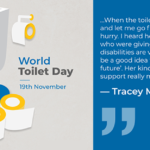
Clean Toilets Matter To Aussies
Crohn’s & Colitis Australia (CCA) is championing World Toilet Day on 19 November by reminding the community that accessibility to clean toilets is not just a third world problem.

Crohn’s & Colitis Australia (CCA) is championing World Toilet Day on 19 November by reminding the community that accessibility to clean toilets is not just a third world problem.